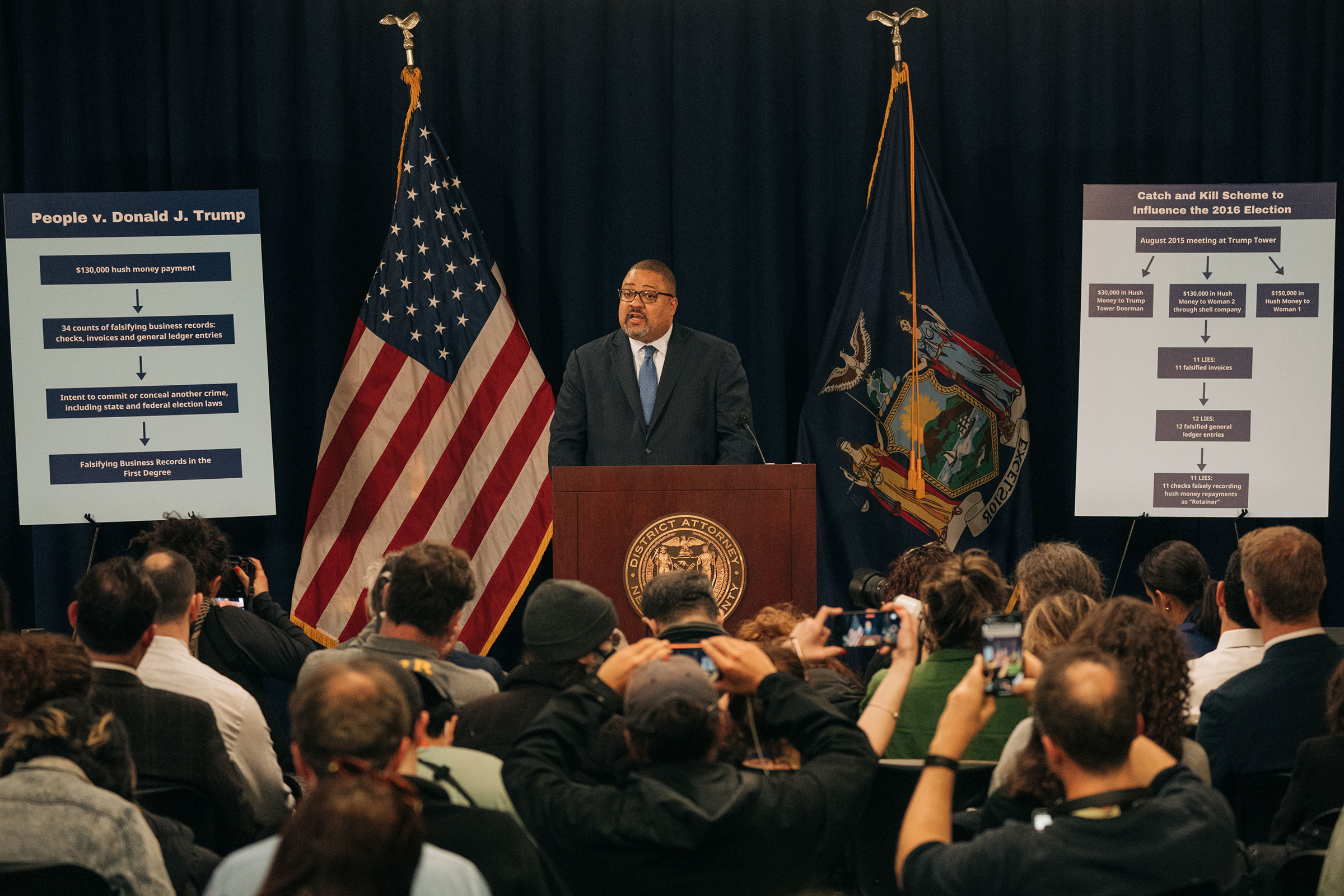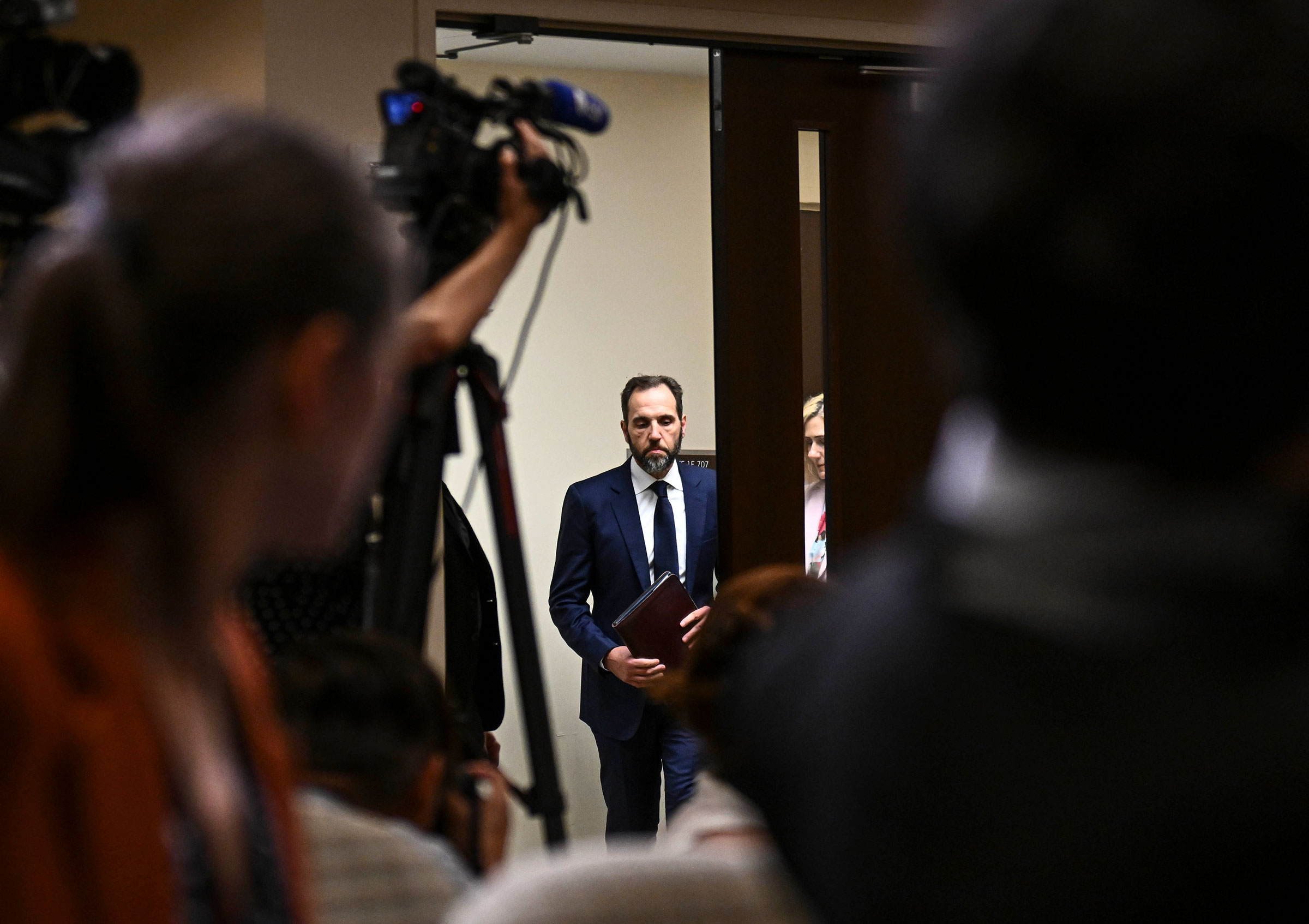When Manhattan District Attorney Alvin Bragg indicted Donald Trump last April, the first criminal indictment of a former President in history, the case drew some derision. Prosecuting a former President over hush-money payments to a porn star seemed trivial and relied on a legal technicality to bump the charges up to felonies, some said. Given that three other cases were targeting Trump for trying to overthrow the 2020 election and refusing to return national security secrets, Bragg’s case seemed like weak sauce.
Ten months later, the New York case has become less of an afterthought. In fact, it might end up being the main show. As the other three cases find themselves facing various legal roadblocks, Bragg may be the best positioned to hand Donald Trump a felony conviction before the November election.
Bragg is gearing up to bring Trump to trial in late March, according to a person familiar with the case, hopscotching over a federal case focused on the Jan. 6 attack on the Capitol that had been previously seen as likely to be the first of Trump’s four criminal trials. While Trump’s inner circle says it would prefer none of the criminal trials happen before Election Day, some see a trial on the New York case as the next best outcome for the former President. "It is the goofiest of all cases,” says a Republican strategist close to the Trump campaign. “If Trump beats this case, it sets the tone and feeds into his narrative that all of these cases are a witch hunt.”
The Bragg case hinges on the timing of Trump’s efforts to cover up a sex scandal—weeks before the 2016 election. Trump is charged with 34 counts of faking business records to hide payments to actress Stormy Daniels intended to stop her from publicly describing a sexual encounter. Bragg has argued that the charges should be bumped up to felonies from misdemeanors because the payments were covering up a federal crime: election interference.
The core of the case “is not money for sex,” Bragg said in a Dec. 22 interview on WNYC New York Public Radio. “We would say it's about conspiring to corrupt a presidential election and then lying in New York business records to cover it up,” Bragg said.
Bragg’s office is watching closely for New York state judge Juan Merchan to rule as early as next week on an effort by Trump to get the case tossed out, according to a person familiar with the case. Trump has argued the indictment should be thrown out on grounds that state laws don't affect federal elections and that the case was politically motivated. Bragg and his staff see signs that point to Merchan rejecting that argument, further bolstering their legal theory that charging Trump with felonies because of how the hush-money payments impacted the presidential election is valid.
Merchan’s ruling will follow one in July from Judge Alvin Hellerstein in the Southern District of New York, who kept the case in state court and affirmed the prosecution’s assertion that “Trump can be convicted of a felony even if he did not commit any crime beyond the falsification, so long as he intended to do so or to conceal such a crime.”

Within Bragg’s office, staff are operating under the assumption that the case will move to jury selection on March 25. The prosecution believes it could present its case in 3 to 4 weeks, which could pave the way for a verdict by the summer, well before the November election. If convicted, Trump could face a sentence up to four years in prison.
Bragg’s recently bulked up the team handling the case by adding one of the city’s most experienced trial attorneys, Joshua Steinglass, who has tried high-profile gruesome homicides in front of New York juries. He also worked on the white collar case that convicted the Trump Organization of tax fraud last year. Steinglass joins the chief of the investigative division, Susan Hoffinger, Chris Conroy, who has been in the district attorney’s office for two decades, and former senior Justice Department official Matthew Colangelo.
“Which is the most viable, which is the one that could actually go?” says the person familiar with Bragg’s preparations on the case. “All signs are pointing to” Bragg’s case, the person says.
The New York case comes as the other three criminal cases against Trump—two in federal court and one out of Georgia—hit delays and potential roadblocks.
- The Jan. 6 case: Special Prosecutor Jack Smith charged Trump with four counts related to his actions leading up to the Jan. 6, 2021 attacks on the Capitol. That trial was scheduled to start March 4 but has been postponed while Trump’s claim that he has immunity from prosecution winds its way through the courts. An appeals court ruled Tuesday that Trump is not immune from prosecution for actions he took while in office. Trump plans to appeal that decision to the Supreme Court. "President Trump respectfully disagrees with the D.C. Circuit Court's decision and will appeal it in order to safeguard the Presidency and the Constitution,” says Steven Cheung, a Trump campaign spokesperson.
- The classified documents case: Smith’s case dealing with Trump’s refusal to return classified documents from Mar-a-Lago is scheduled for trial in May, but will likely be pushed back over Trump’s pretrial motions and other legal maneuvers.
- The Georgia case: The case charging Trump with interfering in Georgia’s election results is snarled for now in legal challenges over Fulton County District Attorney Fani T. Willis’ personal relationship with the lawyer she appointed to lead the investigation into Trump. While the trial might still begin this year, it is not expected to be completed before Election Day.
If Trump wins the election, he could stop the Justice Department from pursuing the federal cases against him, as well as try to pardon himself from federal charges. As the Georgia and New York cases deal with state crimes, a President’s pardoning power would not apply.

Bragg has said that he won’t stand in the way if one of the other cases is ready to move first. “We’re not going to stand on ceremony. There’s other dockets here, broader justice may warrant another case going first, but we stand at the ready,” Bragg said during a Jan. 8 interview with NY1. At this point, the New York case seems best positioned to go to trial first.
Trump’s camp thinks his legal woes won’t cripple his election chances, despite polls that suggest he could lose significant support if convicted of a felony. "Even with a conviction in any of these cases, President Trump is still neck and neck with Joe Biden,” says a source close to Trump. “That should scare the hell out of the Democrats.”
More Must-Reads from TIME
- Inside Elon Musk’s War on Washington
- Meet the 2025 Women of the Year
- The Harsh Truth About Disability Inclusion
- Why Do More Young Adults Have Cancer?
- Colman Domingo Leads With Radical Love
- How to Get Better at Doing Things Alone
- Cecily Strong on Goober the Clown
- Column: The Rise of America’s Broligarchy
Contact us at letters@time.com